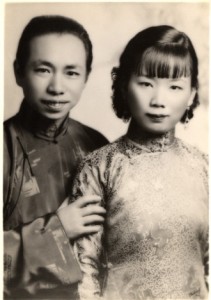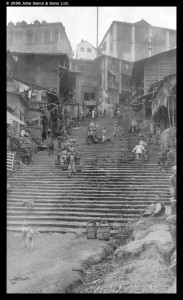As part of a series of events and films marking its tenth anniversary year, the AHRC, which funds the BICC though its LBAS scheme, has made a short film about the ‘Historical Photographs of China‘ project at the University of Bristol. The project has received a lot of support from BICC and the AHRC, and is also being showcased on 2-4 March at the government’s UK Trade & Investment’s ‘GREAT Festival of Creativity’ in Shanghai.
Category Archives: University of Bristol
BICC Cultural Engagement Partnership @ the University of Bristol
Applications are invited for this short-term post, to commence at a mutually agreed date in the first half of 2015 under the direction of Professor Robert Bickers, at the University of Bristol. The aim of this initiative is to support individuals working on three-month ‘Cultural Engagement projects’ with a non-university partner, allowing early career researchers who have just completed a PhD in a Chinese studies field to gain experience of working in or in collaboration with a non-university partner. This could involve working on a discrete research project, or outreach initiative, preparing some work to support a forthcoming, or on-going exhibition etc.
The post would formally be held at the University of Bristol, and the post-holder would be styled as a BICC Early Career Researcher but could be physically based anywhere in the UK. There is a modest budget for travel. Applicants should provide a c.v., as well as an expression of interest including an outline project description, and a letter of support from the identified cultural sector partner. ‘Cultural sector’ is very broadly conceived, and could include museums, libraries, creative sector SMEs, or other public or third sector cultural or civic organisations, etc. The post is likely to be restricted to areas that fall within the purview of the British Inter-university China Centre, that is, that require Chinese language skills and Chinese studies training.
Duration: Three (3) months full-time or six (6) months at .5 FTE
Salary: £30,424, pro-rata.
Start date: to be agreed.
How to apply: An expression of interest (including an outline of the proposed project), letter of support, and c.v., should be emailed to Professor Robert Bickers, University of Bristol, by 16 February 2015: hums-bicc@bristol.ac.uk
One reference in support of the applicant should also be received by the same date by email. A completed PhD is preferred, but applicants who have submitted their thesis for examination will also be considered.
Applicants may be called for interview in late February.
Exceptionally, two of these short-term appointments may be made should there be sufficiently strong proposals.
Crossover Videos: Westerners in China and Chinese in the UK
Three documentary videos and discussion
Time: June 16, 2014 from 3-6.30pm
Place: London School of Economics, St Clements Building, STCS.75
Sponsored by the British Inter-university China Centre (BICC). Funded by the Arts and Humanities Research Council
Schedule
3.00-3:15 Introduction, Robert Bickers and William A. Callahan
3:15-5:30 Video screening
3:15-3:45 “Robert Hart: For China and the World”; Jeremy Routledge & Robert Bickers
3:50-4:15 “Uncle Chuck: The Shanghailander”; William A. Callahan
4:15-4:45 “BBC” (British Born Chinese); Elena Barabantseva, Andy Lawrence, Ben Cheetham, Tom Turner
4:45-6:30 Panel discussion: Video documentary in humanities and social science research
Chair: Jeffrey Wasserstrom (UC, Irvine)
Panelists: Bickers, Routledge, Callahan, Barabantseva, Cheetham, Turner
Any questions, please contact w.callahan@lse.ac.uk
Robert Hart: For China and the World (31 minutes)
Robert Bickers (Bristol University) and Jeremy Routledge (Calling the Shots films)
‘For China and the World’ explores the largely forgotten history of Britain in China from the 1850s to the early 1900s through the life of Irishman Sir Robert Hart. Hart was the inspector general of China’s Imperial Maritime Customs from 1863 to 1911. An employee of China’s ruling Qing dynasty, he played a crucial role in the economic development of the country and in its interaction with foreign powers. Filmed in Shanghai and Northern Ireland, the film outlines the personal and political conflicts that motivated one of the most important foreign figures in Chinese history, as well as his legacy today.
Trailer: www.roberthartfilm.org
“Uncle Chuck: The Shanghailander (22 minutes)
Bill Callahan (London School of Economics)
What was it like to be an American in Shanghai in the 1920s? ‘Uncle Chuck: The Shanghailander’ examines the life-style of an American businessman who went to Shanghai in 1924, and left just ahead of the Red Army in 1949. It chronicles Chuck’s journey from small-town America to cosmopolitan Shanghai, and shows how he pursued the American Dream in inter-war China. The film puts the details of his family history in the context of global imperial history, when Shanghai was controlled by Europeans, Americans and Japanese.
Trailer: https://vimeo.com/47901393
BBC (British Born Chinese) (30 minutes)
Elena Barabantseva (University of Manchester), Andy Lawrence, Ben Cheetham, Tom Turner (All Rites Reversed Films)
Little is known about life in the British Chinese community, which remains invisible to the public eye. Daniel (age 11) and Kevin (age 13) are Chinese boys born in England, and this film explores how they fuse their Britishness with a strong sense of Chinese identity. We look at the boys’ experiences at school and how they relate to people in their neighbourhoods, how they formulate their belonging and to what extent they feel they are stigmatised for being different. This is a ‘coming of age’ story, not just of two boys but of a community. What can we expect from the next generation of British born Chinese?
Trailer: http://www.allritesreversed.co.uk/british-born-chinese.html
Dr Diana Yeh writes about her Penguin Books China Cultural Engagement Partnership
 As a scholar working on the Chinese in Britain, I was excited to embark on BICC’s knowledge exchange partnership with Penguin Books China, researching Penguin’s UK back catalogue of works on China and China-related themes from 1930s to the 1960s. These Penguin first editions encompass an extraordinary array of novels, poetry, reportage and non-fiction for adults and children, from Pearl Buck’s classic The Good Earth (1960) to the notorious Sax Rohmer’s The Mystery of Fu Manchu (1938) and lesser known works of forgotten writers such as Winifred Galbraith and Tsui Chi.
As a scholar working on the Chinese in Britain, I was excited to embark on BICC’s knowledge exchange partnership with Penguin Books China, researching Penguin’s UK back catalogue of works on China and China-related themes from 1930s to the 1960s. These Penguin first editions encompass an extraordinary array of novels, poetry, reportage and non-fiction for adults and children, from Pearl Buck’s classic The Good Earth (1960) to the notorious Sax Rohmer’s The Mystery of Fu Manchu (1938) and lesser known works of forgotten writers such as Winifred Galbraith and Tsui Chi.
Thanks to the Penguin Archive at Bristol University, I was able to unearth the genesis of Penguin’s acquisition of the books and piece together its role in sustaining and shaping knowledge of China in Britain during these decades. My own research has focused on constructions and contestations of Chineseness by examining how migrant Chinese artists, whose lives spanned Britain, Italy, South Africa, China and Taiwan from the 1930s to the present day, negotiate identity and belonging in diaspora.
Of particular relevance to the Penguin project is the world of Shih-I and Dymia Hsiung, two once highly visible, but now largely forgotten Chinese writers in Britain. Shih-I rose to worldwide fame with his play Lady Precious Stream in the 1930s and became known as the first Chinese director to work in the West End and on Broadway. In 1952, Dymia became the first Chinese woman in Britain to publish in English a fictional autobiography, Flowering Exile. In The Happy Hsiungs: Performing China and the Struggle for Modernity (Hong Kong University Press, 2014), I recover the Hsiungs’ lost histories and discuss the challenges they faced in representing China to the rest of the world and becoming accepted as modern subjects, at a time when knowledge of China and the Chinese was persistently framed by colonial legacies and Orientalist discourses.
While my analysis focused on how the Hsiungs’ success was shaped by unfolding socio-economic, cultural and political circumstances, the Penguin project allows me to locate their works in a literary context. Ernest Bramah’s series of Kai Lung stories (1936–38) and China muckraker Samuel Merwin’s fantastical tale of China, Silk (1942), highlight the popularity of chinoiserie that helped propel Hsiung to fame. It was also interesting to compare Hsiung’s limited success with his play The Professor of Peking (1939), which focused on the political realities of China during the warlord period to American Pulitzer-prize-winning journalist Edgar Mowrer’s Mowrer in China (1938), a report of the unfolding war in China, published as a Penguin Special.
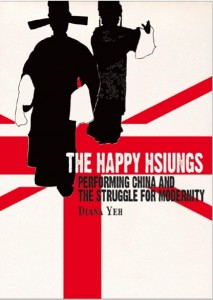 In the Happy Hsiungs, I detail how Dymia Hsiung’s Flowering Exile, a story of her family’s life in Britain from the late 1930s to the early 1950s, was criticized by the press at the time as ‘prosaic’ when compared to other contemporary tales of a ‘China of legend’ that captured ‘the strangeness and the charm of that fabled land’. Yet, if Penguin’s output is anything to judge by, stories of journeys in the opposite direction, from Britain to China, remained popular. While Ann Bridge’s Peking Picnic (1938) and The Ginger Griffin (1951) are both set in the foreign legations in Beijing, Denton Welch’s autobiographical Maiden Voyage (1954) charts his escape from school in England to Shanghai where he was born. Meanwhile, Harold Acton’s Peonies and Ponies (1950), a satire of the foreign community in republican-era Peking, has recently been described by contemporary Penguin author Paul French as ‘the wittiest and best observed novel of the period, and the one that best encapsulates the goldfish bowl world of the privileged’ in China.
In the Happy Hsiungs, I detail how Dymia Hsiung’s Flowering Exile, a story of her family’s life in Britain from the late 1930s to the early 1950s, was criticized by the press at the time as ‘prosaic’ when compared to other contemporary tales of a ‘China of legend’ that captured ‘the strangeness and the charm of that fabled land’. Yet, if Penguin’s output is anything to judge by, stories of journeys in the opposite direction, from Britain to China, remained popular. While Ann Bridge’s Peking Picnic (1938) and The Ginger Griffin (1951) are both set in the foreign legations in Beijing, Denton Welch’s autobiographical Maiden Voyage (1954) charts his escape from school in England to Shanghai where he was born. Meanwhile, Harold Acton’s Peonies and Ponies (1950), a satire of the foreign community in republican-era Peking, has recently been described by contemporary Penguin author Paul French as ‘the wittiest and best observed novel of the period, and the one that best encapsulates the goldfish bowl world of the privileged’ in China.
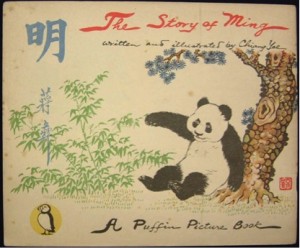 It was also fascinating to explore the works of Chiang Yee and Tsui Chi, who were close friends of the Hsiungs and shared their homes in Hampstead and Oxford. Both wrote for adult audiences and Chiang Yee was popularly acclaimed for his Silent Traveller series, but wrote children’s books for Penguin’s first children’s series – the Puffin Picture Books. While Chiang Yee illustrated his own Lo Cheng: The Boy Who Wouldn′t Keep Still (1942) and The Story of Ming (1944), Tsui Chi collaborated with the illustrator Carolin Jackson for his The Story of China (1945).
It was also fascinating to explore the works of Chiang Yee and Tsui Chi, who were close friends of the Hsiungs and shared their homes in Hampstead and Oxford. Both wrote for adult audiences and Chiang Yee was popularly acclaimed for his Silent Traveller series, but wrote children’s books for Penguin’s first children’s series – the Puffin Picture Books. While Chiang Yee illustrated his own Lo Cheng: The Boy Who Wouldn′t Keep Still (1942) and The Story of Ming (1944), Tsui Chi collaborated with the illustrator Carolin Jackson for his The Story of China (1945).
Other notable highlights of the collection include feminist adventurer Alexandra David-Néel’s My Journey to Lhasa (1940), an account of her extraordinary 2000-mile journey on foot to the forbidden city. Disguised as a beggar and accompanied by a novice monk whom she later adopted, she arrived in Lhasa in 1924, winning her accolades as the third European to reach the city in the twentieth century. Equally remarkable is the life of Winifred Galbraith, a missionary teacher who repeatedly defied orders from the British authorities to leave China during Mao’s attempted Autumn Harvest Uprising. Her book, entitled (not without protestation), The Chinese about ‘the nature of the civilization on which China is building her new society’, was published by Penguin as a Pelican in 1942.
Disputes between Penguin editors, notably in the acquisition of Sax Rohmer’s The Mystery of Fu Manchu (1938) – and negotiations between editors, authors, translators and illustrators – account for and shaped Penguin’s varied output on China and China-related themes during this period. Such contestations in the construction of China and Chineseness, of course, continue today.
In March 2014, supported by BICC, I gave a series of talks in China about the intersections of the Penguin China project with my research on the lives of the Hsiungs, at the Bookworm International Literary Festival in Beijing and Suzhou and at the Royal Asiatic Society Shanghai. I also discussed both projects in the context of my current research on contemporary youth identity formations at the University of Nottingham Ningbo China. As Penguin China approaches its tenth year anniversary, plans are afoot to feature some of these early Penguin writers on China in a forthcoming touring exhibition in Asia. Such projects promise to contribute to the vital task of widening knowledge of and reflecting on British–Chinese relations both historically and in the present day.
Dr Diana Yeh will be taking up a position as Senior Lecturer in Sociology at the University of Winchester in June 2014.
Introducing Dr Tehyun Ma
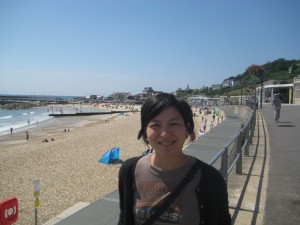 As a BICC postdoctoral researcher at the University of Bristol’s history department this past year, I have had the opportunity to work on a number of fascinating projects that have expanded my research horizons and encouraged me to rethink the way I approach source material in my own work. The first of these has been the Historical Photographs of China – also known as the Visualising China – project. It introduced me to a rich visual record of the Chinese past, full of serendipitous interconnected personal histories and forgotten vistas.
As a BICC postdoctoral researcher at the University of Bristol’s history department this past year, I have had the opportunity to work on a number of fascinating projects that have expanded my research horizons and encouraged me to rethink the way I approach source material in my own work. The first of these has been the Historical Photographs of China – also known as the Visualising China – project. It introduced me to a rich visual record of the Chinese past, full of serendipitous interconnected personal histories and forgotten vistas.
The second, which is tied to the ACRE (Atmospheric Circulation Reconstruction over the Earth) endeavor at the MET Office, gave me a glimpse of how the travel writings and records of nineteenth-century adventurers and merchants could be put to use to measure historical patterns of climate change. Both projects have given me a sense of how history could be put to use both directly and indirectly: from heritage and educational work to thinking about perhaps the biggest challenge of our time.
My own research explores China and Taiwan. Over the past few years, with the help of a postdoctoral fellowship on the Leverhulme-funded China’s War with Japan project that ran from 2009-2011, I’ve been looking at plans for rehabilitation and reconstruction in China during the war years. The first part of this research, which interrogates the transnational influence of reconstruction planning, recently appeared in the European Journal of East Asian Studies. This article analyses the influence of the Beveridge Report and the American Social Security Act on Chinese social policy planners, exploring what their interest in these designs can tell us about the contours of the Nationalist (Guomindang) state in an era of total war.
My interest in postwar planning developed from my Ph.D., which I undertook at Bristol under the supervision of Professor Robert Bickers. The thesis focused on the first decade of Guomindang rule on Taiwan from 1945-1955, considering how the problem of mobilising a disaffected (and terrorised) island population help shaped the way party leaders reformed what a decrepit party-state. Their state-building techniques, I argue, provide an insight into how party leaders and the rank-and-file conceived of how authority was earned and used. This work adds to the growing literature on the political culture of the early Cold War in East Asia. I will be giving a talk on this project next week, August 13, as part of Hoover Institute’s workshop series ‘Revisiting Modern China’.
The BICC postdoc this year afforded me some valuable time to advance my research and teaching as well as introduce me to realms of history and public engagement that I had not experienced before. It has proven a vital stepping stone in the development of career . As of September 2013, I will be taking up a permanent lectureship in Chinese History at Exeter University, but I am keen to keep up with the projects I’ve been involved with over the past few months.
‘Historical Photographs of China’ on new AHRC image gallery
The ‘Historical Photographs of China’ project, which has been supported over the past year by the BICC, has been chosen to provide materials for the second display on the new online Image Gallery on the website of the Arts & Humanities Research Council. A selection of images was made from a recently-digitised collection of photographs mainly taken by a young printing manager, Jack Ephgrave, who worked for the British American Tobacco Company in Shanghai from 1929 onwards. These have just gone live under the title Picturing China with commentary from Robert Bickers, with the assistance of BICC research associate Dr Tehyun Ma and Jamie Carstairs, Project Digitzation Officer.
Hello, Chongqing! 重庆您好!
BICC researcher Dr Tehyun Ma is representing the Centre at the launch today of a new exhibition, ‘Historical Photographs of China: Photographs from British Collections‘, ‘1870-1950:英国收藏的中国影像’. While the core of this exhibition was recently on display in Beijing, the Sichuan outing of the show contains many additional rare shots of the city of Chongqing, mainly from the G.W. Swire and Fu Bingchang collections held within the ‘Historical Photographs of China’ website.
The exhibiton at Chongqing Tiandi is being opened by Benedict Mann, British Deputy Consul-General in Chongqing, and is the resul of a collaboration between the Consul-General Press Team, RCUK China, and the British Inter-university China Centre. BICC is funded by the AHRC and the ‘Historical Photographs of China’ has been supported as an Academy Research Project since 2006 by the British Academy.
The project also runs the related ‘Visualising China‘ portal, and the Visualising China blog, and the latest post there explores Chongqing, the Yangzi, and its place in the British imagination.
Introducing Dr Mike Gow
 I was fortunate enough to receive funding from BICC as part of the first cohort of scholarships awarded in 2006. I undertook my academic training at Masters and Doctoral level at the Centre for East Asian Studies at the University of Bristol, supervised by Professor Susan Robertson and Professor Jeffrey Henderson. BICC has been the determining factor in shaping my career, affording me an opportunity for academic development that I otherwise would not have had. In addition, I have made some lifelong friends through BICC who are already active as China scholars across a range of disciplines.
I was fortunate enough to receive funding from BICC as part of the first cohort of scholarships awarded in 2006. I undertook my academic training at Masters and Doctoral level at the Centre for East Asian Studies at the University of Bristol, supervised by Professor Susan Robertson and Professor Jeffrey Henderson. BICC has been the determining factor in shaping my career, affording me an opportunity for academic development that I otherwise would not have had. In addition, I have made some lifelong friends through BICC who are already active as China scholars across a range of disciplines.
My research focuses on the strategic transformation of Chinese higher education, and aims to understand how national modernization projects are materialized within China’s political society and then mediated and institutionalized. The thesis recognizes processes of negotiation, consent and coercion between China’s political society and civil society, discerning a tightly interwoven relationship between the state and Chinese HE and also proposes that HE is central to the negotiation of hegemony within the contemporary Chinese historic bloc. However, it also aims to understand the complex social, cultural and institutional environment of Chinese HE through which overarching national projects must be processed. The research utilizes Burawoy’s Extended Case Method and theoretical framework constructed around Antonio Gramsci’s theory of hegemony and Bourdieu’s concepts of capital, field and habitus.
I have taught a range of subjects over the last few years, including Contemporary Chinese Society, Chinese Political Systems, Contemporary Chinese Cultural Conventions and Chinese Business Context. As of August 2013 I will be taking a post at NYU Shanghai as Global Postdoctoral Fellow in the inaugural year of this new campus of New York University. My role will be research-focused, but I am also looking forward to contributing to a Freshman course “Global Perspectives on Society” led by NYU Shanghai Vice Chancellor Professor Jeffrey Lehman. The course will introduce students to some of the greatest thinkers from both western and Chinese traditions.
Chinese HE continues to be the focus of my research and I blog on Chinese HE, internationalization of Chinese HE and Chinese HE policy at http://www.thedaxue.org

